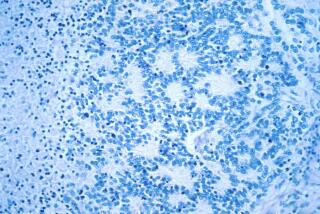New Blood Therapy Shows Promise in Cancer Battle
- Share via
BOSTON — Doctors say they apparently have been able to vaccinate some cancer patients against their own disease by using light to activate a powerful drug while it is in the bloodstream.
The technique has produced remissions in some cases of a fatal blood cancer that had not responded to other types of treatment. It appears to marshal the body’s immune defenses to destroy the cancer without the nausea, hair loss or other side effects of chemotherapy and radiation.
“It’s a very early stage in the development of something very exciting,” said Dr. Richard Edelson, inventor of the treatment. “I don’t want to overestimate where we are, but with a single disease we’ve got some strong concrete data.
“For the first time, a drug that has no activity by itself has been activated by light in the blood of patients as their blood was being routed outside the body,” said Edelson, who is chief of dermatology at Yale Medical School.
Broad Potential Seen
He said that the treatment may become standard for cutaneous T-cell lymphoma, which the American Cancer Society says strikes about 1,000 people each year. It also may be effective against other forms of blood cancer, arthritis and organ transplant rejection.
The work, conducted at five institutions in the United States and Europe, was described in today’s New England Journal of Medicine.
Under the treatment, a patient takes the drug methoxsalen, which is inert unless exposed to light. Blood is removed from the patient’s arm through a clear plastic tube and exposed to ultraviolet light.
The light activates the drug so that it attacks and kills the white blood cells, but elsewhere in the body it remains dormant. Finally, the blood, containing the dying cells, is returned to the patient.
Response Kills Cancer
Even though all white cells in the treated blood are killed, most of them are of the malignant type. Edelson believes that the dying cells in the bloodstream trigger an immune reaction that destroys other cancerous cells but spares the normal white cells affected by the drug in lesser numbers.
The 37 patients studied by Edelson and his colleagues each had a life expectancy of about 30 months. Two-thirds of them responded to the therapy, including 13 who had remissions of at least 50%.
Most of the patients continued to have treatments a few times a month, but two have been off the therapy about two years without any sign of the disease.






